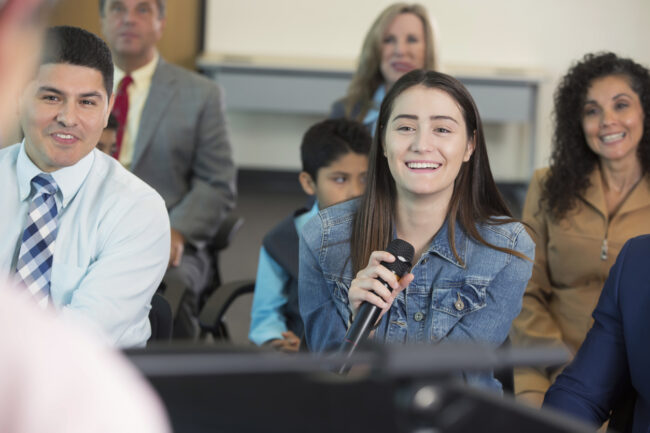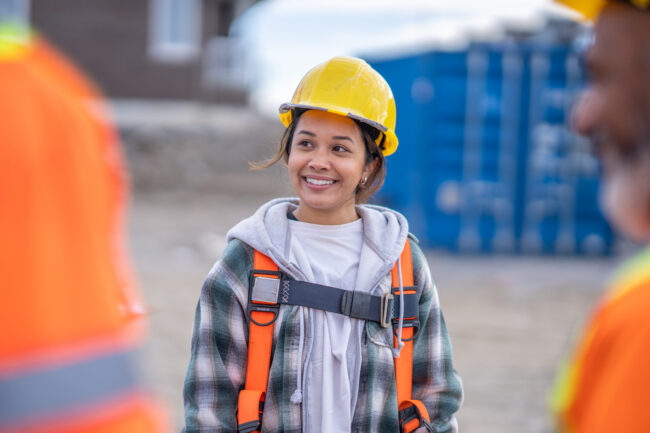The PNHWH2 Hub’s proposed projects will focus on creating economic opportunity across all demographics to improve the lives and futures of people throughout the region.

COMMUNITY BENEFITS OVERVIEW
The PNWH2 Hub is committed to community engagement and environmental justice through our partnerships with labor, Tribal Nations, and the public and private sectors.
PNWH2 will benefit communities and invest in the region’s workforce by:
- Creating and supporting more than 10,000 high-quality local jobs
- Supporting meaningful community and labor engagement
- Enabling pathways for new STEM-based education programs
- Advancing diversity, equity, inclusion and accessibility in the workplace
- Ensuring benefits flow to tribal communities through consultation and partnerships
Staying focused on what matters: people and the environment.
Meaningful community engagement has been part of PNWH2 planning from the beginning – and will continue to play a central role as the Hub evolves. This includes involving community stakeholders close to or otherwise potentially impacted (e.g., along transportation routes) by proposed activities. The Hub will also ensure all relevant stakeholders and tribal sovereigns are at the table early and continuously as states transform the region’s energy economy.
Additional community engagement seeks to inform potential node communities about the technologies involved, discuss job and business opportunities that may become available, increase knowledge of project timing, and provide opportunities for input to improve PNWH2 Hub Energy Equity and Environmental Justice (EEEJ) outcomes.
Energy Equity and Environmental Justice (EEEJ) planning aligned with the federal Justice40 Initiative is vital. The PNWH2 Hub will build on state EEEJ laws, including Washington state’s Healthy Environment for All (HEAL) Act. The hub’s proposed projects and our partners are collaborating on the following to ensure our efforts are sustainable and make a difference over the long term.
ACTIVELY ENGAGING COMMUNITIES
Our Community Benefits Plan.

Our Hub’s vision incorporates engaging communities, tribes and labor stakeholders to build trust and support, including conducting ongoing outreach and information sharing to foster two-way communication and active public and stakeholder participation.
You’ll hear more from the PNWH2 Hub and our projects following award negotiations with the U.S. Department of Energy (DOE) that will determine the PNWH2 Hub’s final federal funding levels and scope. We anticipate those negotiations will conclude in summer 2024.
The PNWH2 Hub will kick off Phase 1 (detailed project planning) in mid-2024 to refine projections submitted in our proposal and provide assurance to DOE that the overall hydrogen hub concept and proposed projects are technologically, financially and legally viable, with buy-in from local stakeholders. Project partners, who have been engaging with local communities for many months, will build on this groundwork with extensive community and labor engagement in Phase 1.
Community Benefits Plan: Frequently Asked Questions
What is a Community Benefits Plan?
The PNWH2 Hub created a Community Benefits Plan (CBP) as part of our application to the DOE Regional Clean Hydrogen Hubs funding opportunity announcement (FOA). The CBP outlines how the proposed projects will benefit the local community and address environmental justice issues.
The plan is based on four DOE core policy priorities:
- Investing in America’s workforce
- Engaging communities and labor
- Advancing diversity, equity, inclusion and accessibility
- Implementing the Justice40 Initiative
Following award negotiations with DOE, we will work with our projects and other partners to implement our Community Benefits Plan, a foundational element of our Hub’s work in the region to engage communities and deliver a shared vision of clean and equitable energy systems in the Pacific Northwest.
What kinds of community benefits will be provided?
Following successful award negotiations with DOE, benefits will include ongoing community and labor engagement for mutual knowledge-sharing and the coordination of strategies and best practices focused on:
- Community benefits education and accountability
- Quality jobs hired locally to the greatest extent possible at all levels, supported by training and development programs that are family-supportive and coordinated with local and regional tribes, labor organizations, colleges and universities
- Commitment to Community Benefits Agreements (CBAs) and Project Labor Agreements (PLAs)
- Engagement with K-12 schools, higher education and community organizations to learn about hydrogen safety and technology and how to be a part of the hydrogen future
- Access to clean energy
- Reduced emissions, especially particulate emissions associated with fossil-based transportation fuels
What outreach to communities has already been done?
The PNWH2 Hub has already conducted significant community engagement work to-date, including initial community outreach and numerous letters, presentations and discussions with tribes in the region – but that’s just the beginning. The robust Community Benefits Plan that has been developed will continue this critical work to have community input shape the Hub and equitably distribute benefits.
How will the Hub benefit communities?
Our hub aims to benefit communities by using successful approaches developed in the Pacific Northwest to advance equity and environmental justice, leveraging the project team’s existing relationships to achieve meaningful community and tribal partnerships.
Consistent with the Biden-Harris Administration’s Justice40 Initiative, we will continue to engage communities to define and quantify benefits, avoid disproportionate burdens, and closely track and adjust, if necessary, to ensure that at least 40% of benefits flow to disadvantaged communities. This is consistent with policies such as the Healthy Environment for All (HEAL) Act, which requires equitable distribution of benefits in major state environmental policies in Washington.
These benefits will include new, high-quality careers and the development of education and training programs from K-12 through college to ensure a pipeline of trained and qualified workers to build, then operate and maintain these new projects.
How much input will communities have in the future?
Each project or co-located collection of projects has conducted initial outreach in their local community. Once negotiations with DOE are complete and we have final decisions on project scope, siting and funding, we will conduct significant public outreach and engagement. Communities will be deeply involved throughout the Hub planning process and will contribute to the final determination of how benefits are distributed and tracked.
How will your Community Benefits Plan/efforts advance diversity, equity, inclusion and accessibility (DEIA)?
Advancing diversity, equity, inclusion and accessibility in the workplace is an essential component of our Community Benefits Plan. Our project partners are committed to ensuring our collective efforts embed DEIA throughout the workforce and contribute to the Biden-Harris Administration’s Justice40 Initiative with the goal to flow 40% of overall benefits to disadvantaged communities, as required by the U.S. Department of Energy.
CREATING JOBS
The Workforce Development Plan.

Key considerations for workforce development as part of the PNWH2 Hub strategy include the following:
- Creating an economy that supports high labor standards and good, ideally union jobs, including apprenticeships.
- Project Labor Agreements (PLAs) and Community Workforce Agreements (CWAs) that include labor standards.
- Tools that support the participation of Women-, Minority/BIPOC-, and Veteran-owned businesses and workers.
- Commitments to utilize local and U.S.-made materials and local businesses where possible.
- Policies that provide employment and training to workers in the fossil fuel and related sectors, with a focus on training and transitioning to clean energy jobs that utilize similar, transferable skills.
Jobs + Education: Frequently Asked Questions
What kinds of jobs will be created by the PNWH2 Hub?
The PNWH2 Hub’s projects will drive economic opportunity across all demographics, creating or supporting more than 10,000 good-paying jobs and stronger energy security to improve the lives and futures of people throughout the region.
We expect to create or support jobs in multiple industries, including construction (pipefitting, steelwork, welding, carpentry, etc.), infrastructure maintenance and operations (engineers, chemists, field technicians, etc.), transportation (mechanics, operators, vehicle design/construction, etc.), and management (planners, accountants, business development, marketing, etc.).
How do you define good-paying and quality jobs?
Our Hub will create or support quality jobs at all levels, bolstered by training and development programs that are family-supportive and coordinated with local and regional tribes, labor organizations, colleges and universities.
Each project has committed to having Community Workforce Agreements (CWAs) and Project Labor Agreements (PLAs) in place that include labor standards. The PLAs will be with one or more labor organizations, which is a pre-hire collective-bargaining agreement establishing the terms and conditions of employment for a specific construction project.
Where will the construction labor and other workers come from?
The PNWH2 Hub projects plan to hire locally to the greatest extent possible. The PNWH2 Hub will be working with local colleges, universities, and K-12 school programs to develop and train the future hydrogen workforce and develop programs to support workers displaced from the carbon economy.
What commitment to union labor will be made?
Our proposed projects plan to hire local union labor whenever possible. Each project has committed to having Community Workforce Agreements (CWAs) and Project Labor Agreements (PLAs) in place that include labor standards. The PLAs will be with one or more labor organizations, which is a pre-hire collective-bargaining agreement establishing the terms and conditions of employment for a specific construction project.
Workforce commitments include investing in joint labor-management/state-registered apprenticeship programs, priority hiring programs for former coal industry workers and investing more than $4 million in the Centralia College training center to provide worker training.
What type of training and development programs are planned?
These programs will vary, and more information will be shared following our award negotiations with DOE – anticipated to conclude in summer 2024 – as some aspects of the Hub’s planned scope and scale may be modified during negotiations with DOE.
We aim to provide employment and training to workers in the fossil fuel and related sectors, with a focus on training and transitioning to clean energy jobs that utilize similar, transferable skills.
Some examples of the programs we proposed include apprenticeships, training opportunities to help retain already experienced workers through the clean energy transition, and enable science, technology, engineering and math (STEM) education program pathways to support the hydrogen workforce.
How will you engage with schools and community organizations?
Our proposed projects will work in their local communities to help enable science, technology, engineering and math (STEM) education program pathways to support the hydrogen workforce and engage with K-12 schools, higher education and community organizations to learn about hydrogen safety and technology, and how to be a part of the hydrogen future.
For example, Centralia College helps host an annual STEM Career Academy for high school students. Students attending the 2023 Academy participated in tours, career planning and hands-on activities like building hydrogen-powered model cars.